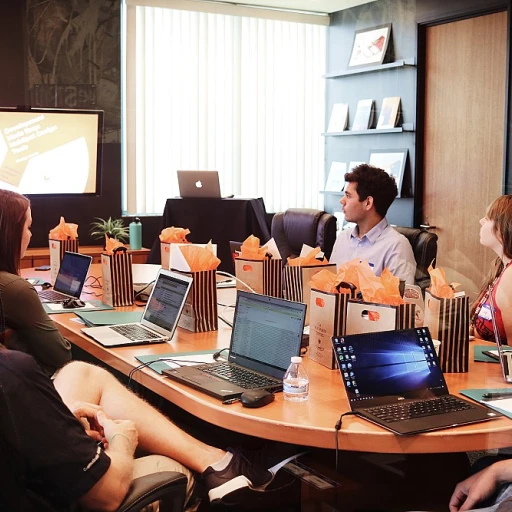
Understanding DEIB Training
The Essence of DEIB Training
Diversity, Equity, Inclusion, and Belonging (DEIB) training has become an essential component for modern organizations striving to foster a more inclusive and dynamic workplace culture. This type of training revolves around the critical understanding of how diversity, equity, and inclusion shape interactions within any organizational environment. DEIB training programs are designed to enrich participants' experience by offering comprehensive insights into inclusive practices. They aim to empower employees by promoting an inclusive leadership style that champions equity and celebrates diversity, ultimately encouraging a workplace where everyone feels a sense of belonging. Moreover, DEIB initiatives are not just about compliance. They are about nurturing an organizational culture where every employee feels valued and respected. The various DEIB training sessions help participants become more aware of unconscious biases, learn inclusive communication techniques, and develop the ability to appreciate multiple perspectives effectively. Organizational commitment to DEIB training signifies a dedication to creating an equitable work environment. Participants will learn how strategic initiatives can critically impact the way employees engage with one another, enhancing overall harmony and boosting organizational effectiveness. Furthermore, understanding the intricacies of DEIB training is a pivotal step in reskilling. The evolution of workplace expectations is accelerating, and training programs addressing diversity inclusion and cultural awareness are key in equipping employees with the necessary skills. Studies suggest that fostering such an environment not only enhances employee engagement but can significantly contribute to business success and growth. For those eager to delve deeper into the significance of intangible skills in reskilling processes, exploring unlocking the power of intangible skills can provide richer insights and understanding into these essential aspects.The Role of DEIB in Reskilling
The Integral Role of Diversity, Equity, and Inclusion (DEI) in Skills Development
Diversity, equity, and inclusion training, often abbreviated as DEI training, plays a crucial role in the reskilling landscape. As organizations strive to create a more inclusive work environment, DEI initiatives become essential. These programs lead to a cultural shift where employees from diverse backgrounds feel a sense of belonging, enhancing overall workplace morale and employee satisfaction.
Incorporating DEI into reskilling efforts not only helps foster an inclusive culture, but it also enriches the learning experience for all participants. Employees will learn to value diverse perspectives and approaches, thereby enabling a more innovative and dynamic work environment. DEI training helps to ensure that diversity and inclusion are at the heart of your organization's skill-building programs.
Furthermore, embedding DEI principles into reskilling initiatives supports the overarching goals of equity and inclusion. By addressing and overcoming potential biases and barriers, DEI training programs aim to promote an equitable learning environment where everyone has access to opportunities, regardless of their background. This not only empowers employees but also aligns with organizational strategies for fostering a strong, cohesive team.
A successful DEI training program integrates best practices to address the specific needs of an organization’s workforce. By aligning with a company’s DEI strategy, such programs provide a foundation for inclusive leadership and help employees feel valued and motivated. For a deeper understanding of how enhancing employability skills through DEI can augment success, explore this path to success. This integration not only brings immediate benefits to organizational culture but establishes a long-term vision for workplace equity and inclusion.
Challenges in Implementing DEIB Training
Overcoming Barriers in Diversity, Equity, and Inclusion Workshops
Implementing DEIB training within organizations often presents several challenges, reflecting the complexity of fostering diversity, equity, inclusion, and belonging. To effectively integrate these elements into the workplace, it's crucial to understand and address these barriers.
- Resistance to Change: One of the most common hurdles is resistance from employees who may be skeptical of the training's value. This can stem from a lack of understanding or previous negative experiences. An inclusive organizational culture that encourages open communication can help ameliorate such resistance.
- Lack of Awareness: Organizations must first ensure that their leaders and managers are aware of existing biases and the importance of DEI initiatives. This awareness is a prerequisite for fostering a culture of acceptance and belonging. A well-structured DEIB strategy can serve as a guide.
- Limited Resources: Implementing effective training programs requires investment in time, money, and effort. Businesses need to prioritize these resources, ensuring training programs are comprehensive and tailored to their specific needs.
- Measuring Impact: Another challenge is assessing the effectiveness of DEIB training. Organizations often struggle with identifying tangible outcomes and metrics. Establishing clear objectives and regular feedback mechanisms within the program will help gauge progress and effectivity.
Overcoming these obstacles involves a clear commitment to an organization's DEIB initiatives. Encouraging inclusive leadership, continual learning, and leveraging best practices can transform workplace culture. For more insights on managing these challenges within the scope of DEIB and reskilling, visit this resource.
Benefits of DEIB Training for Employees
The Transformative Impact of DEIB Training on Employees
Diversity, Equity, Inclusion, and Belonging (DEIB) training is swiftly becoming an essential component in developing an inclusive organizational culture. Participating in DEIB programs not only enhances employees' understanding of diversity and inclusion but also equips them with the skills needed to cultivate a more equitable workplace. Through these training sessions, employees will learn to:- Appreciate diverse perspectives, enhancing interpersonal relationships and organizational culture.
- Embrace inclusive practices that foster a sense of belonging among coworkers.
- Recognize unconscious biases and take actionable steps to mitigate them.
Case Studies: Successful DEIB Training Programs
Real-world Applications of DEIB Training Programs
Employers who incorporate DEIB training into their organizational structure often experience a notable transformation. Here's a glimpse into some successful DEIB training initiatives that have made a significant impact on workplace culture and productivity.- Promoting Inclusive Leadership: By integrating inclusive leadership practices, organizations see an enhancement in decision-making processes and employee engagement. Leaders who undergo DEIB training often develop a deeper understanding of diversity, equity, inclusion, and belonging, fostering an environment where all employees feel valued and respected.
- Building a Cohesive Work Environment: Successful DEIB programs aim to dismantle unconscious biases and promote a culture of inclusion. As a result, the workplace becomes a space where diverse perspectives are not only welcomed but celebrated, leading to innovative solutions and improved team performance.
- Expanding Employee Growth Opportunities: Effective DEIB training helps participants learn to leverage diversity as a key strength. This not only benefits employees by opening up professional development opportunities but also enhances the organizational culture, as diverse voices contribute to the organization's success.
- Case Study Success Stories: Some organizations have set benchmarks by implementing comprehensive DEIB strategies. These companies report higher employee satisfaction and reduced turnover rates, indicating the tangible benefits of a robust DEIB framework.
Future Trends in DEIB and Reskilling
Emerging Directions for DEIB and Reskilling in the Workplace
As organizations adapt to the changing dynamics of the modern business environment, the focus on diversity, equity, inclusion, and belonging (DEIB) continues to gain momentum. Future trends in DEIB and reskilling are driven by the ongoing transformation of workplace culture and the pressing need for inclusive leadership and practices.
Organizations are increasingly recognizing the important role that DEIB training plays in fostering a sense of belonging among employees. With technological advancements, training programs have become more interactive and personalized, enabling employees to engage more deeply in learning experiences. This shift reflects a broader commitment to creating inclusive spaces where employees feel valued and respected.
A future trend is the incorporation of technology-enhanced training methods, such as virtual reality and augmented reality, which can simulate real-world situations to effectively teach diversity and inclusion principles. Companies are implementing these methods to help participants experience diverse perspectives and cultural nuances first-hand, promoting empathy and understanding.
Furthermore, DEIB training is no longer viewed as a standalone session but as an integral part of broader learning and development strategies. Organizations are embedding DEIB principles into all aspects of professional development, thereby ensuring that employees continually refine their understanding of diversity and inclusion.
A greater emphasis on data and analytics is another emerging trend, with companies tracking the impact of DEIB initiatives on organizational performance. Metrics such as employee engagement, retention rates, and innovation levels are used to assess the effectiveness of DEIB strategies, allowing businesses to refine their approaches based on concrete evidence.
Globalization has also influenced DEIB trends, as businesses expand into international markets and build diverse teams. The focus on equity and inclusion requires tailoring DEIB training to align with regional cultural nuances, ensuring relevance and meaningful engagement across varied geographic locations.
In conclusion, the future of DEIB and reskilling lies in continually adapting to meet evolving workplace demands. As more organizations understand the benefits of cultivating a diverse and inclusive culture, DEIB training will play a crucial role in shaping the workplace of tomorrow, creating environments where all employees are empowered to contribute and thrive.













